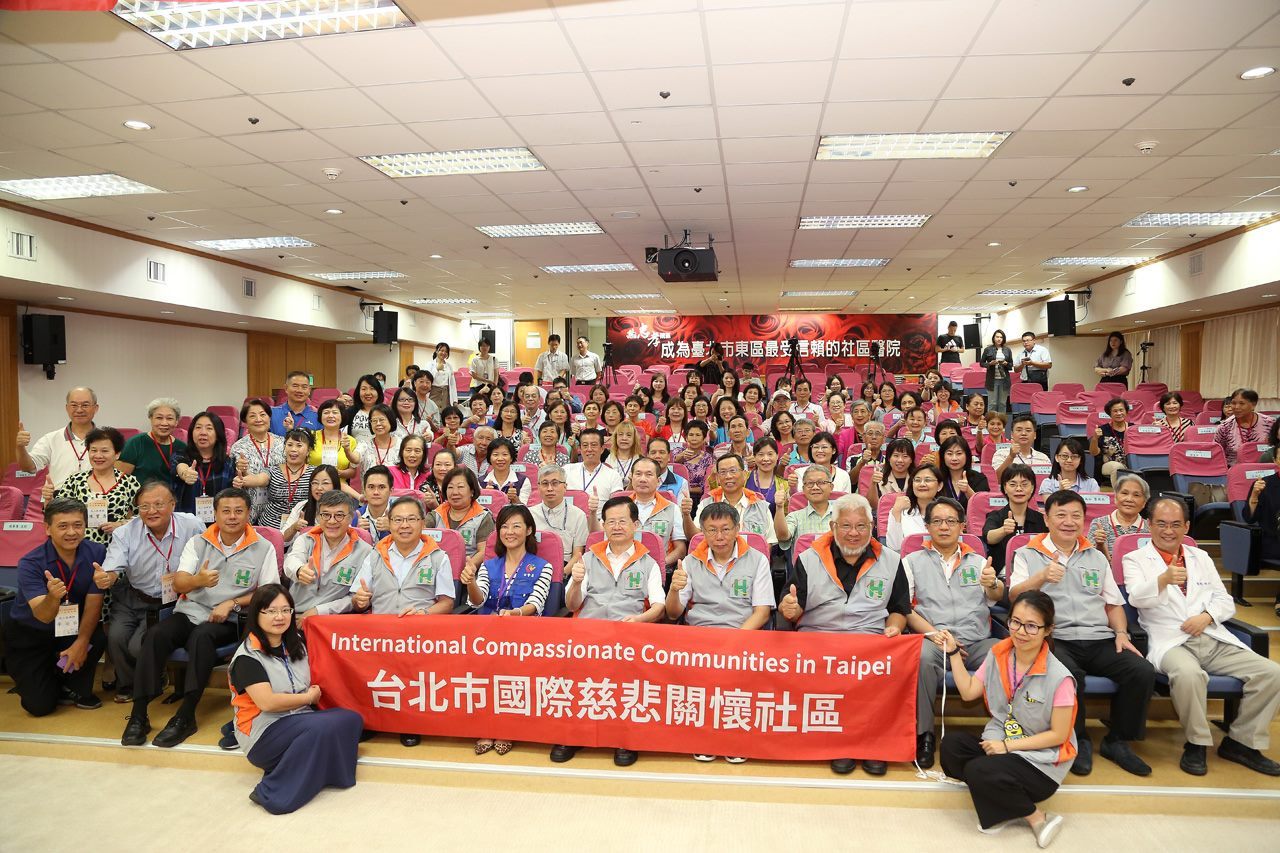Mayor: Seeking Appropriate, Effective Elderly Long-term Care Model through PPP
 Mayor Ko Wen-je attended the Compassionate Community Volunteer Accreditation Event where he gave a short speech. From the outset, he stressed that Taiwan will become a hyper-aged society by 2026, and its ratio of senior citizens will rise from 7% in 1992 to 20% in 2022 within a period of 3 decades. On the contrary, it will take Switzerland 130 years to reach the same figure, therefore the biggest problem in Taiwan is not an aging population but the speed at which the population is aging, and the primary contributing factor is low birth rate.
Mayor Ko Wen-je attended the Compassionate Community Volunteer Accreditation Event where he gave a short speech. From the outset, he stressed that Taiwan will become a hyper-aged society by 2026, and its ratio of senior citizens will rise from 7% in 1992 to 20% in 2022 within a period of 3 decades. On the contrary, it will take Switzerland 130 years to reach the same figure, therefore the biggest problem in Taiwan is not an aging population but the speed at which the population is aging, and the primary contributing factor is low birth rate.
According to Mayor Ko, approximately 6% of Taipei City's senior citizens live in nursing homes, 32% of them are cared for by foreign care workers, and the remaining 62% are looked after by their family. In particular, only 25% of them are using the long-term care system. Ko commented that his problem with the current long-term care policy is that there are 280,000 foreign care workers in Taiwan, but senior citizens aged 65 or above only constitute 17% of the total population. If this number exceeds 20% in 2020 and the elderly care model remains the same, those who cannot afford to hire foreign care workers will still be unable to do so. Besides, the number of foreign care workers is expected to surpass 300,000 over the next few years. Therefore, the mayor has been contemplating ways to replace the 300,000-plus foreign workers with 150,000 domestic care workers, as well as how to let senior citizens who cannot afford care workers enjoy long-term care. By doing so, the GDP and employment rate in Taiwan will be improved immediately.
Mayor Ko suggested that current elderly care system consists of nursing homes, community, and home care. Senior citizens being cared for at home may receive integrated care services such as home service, meal delivery service, assistive device rental, home care, home respite care, and home medical care. In particular, home medical care proves to be the most helpful for senior citizens living in old apartment buildings, and it is also the most appreciated service. The next step involves community care including elderly daycare centers or nursing homes for the elderly, with nursing homes being the least favorable option.
The mayor elaborated that the aforementioned services require patient allocation by the Long-term Care Management Center. The patients may come from communities or hospitals, therefore the Long-term Care Management Center must ascertain the types of service needed in order to render the most adequate services, and this is the approach implemented in Taipei City for the time being. He emphasized that no single system can resolve all the problems, as different types of care are provided in accordance with the patients' conditions.
Ko said that he came across senior citizens complaining to him about the canceling of senior citizens’ allowance, to which he lamented the effectiveness of hatred and fear in political mobilization. Taipei City is still issuing senior citizens’ allowance for mid to low-income households, and the wealth exclusion-oriented social welfare policy allows the allocation of limited social welfare resources to those in the most need. The Senior Card serves multiple purposes including concessionary rates for MRT, bus, Maokong Gondola, sightseeing bus, YouBike, taxi, and public venues in Taipei City. The different strategies aim to encourage senior citizens to go outdoors in an effort to enhance their mobility.
He urges senior citizens to receive pneumococcal vaccinations because pneumonia has become the 3rd deadliest cause of senior citizen fatalities. The mayor demanded the Department of Health increase the rate of pneumococcal vaccinations among senior citizens. He also reminded citizens with elderly people at home that Taipei City Government offers households with income tax less than 5% a subsidy of NT$80,000 to improve their home environment, increase residential safety, and prevent them from accidental falls. For more information, please contact the consultation hotline at 0800-894580. Mayor Ko suggested that on average about 5,000 citizens have called the hotline every year to enquire about further details.
With regards to community kitchens for senior citizens, Mayor Ko emphasized the primary objective of the program is not about food but to facilitate interactions among senior citizens as well as to provide diverse learning and services.
Mayor Ko admitted that Taiwan has not yet decided on the most appropriate senior citizen care model, and new systems must be tested before they are actually implemented. Therefore, Taipei City Government will continue promoting the Stone Soup program. In addition, the city government will encourage the procurement of services instead of hardware or software, where enterprises may submit proposals on how to render senior citizen care most adequately and efficiently. When the proposals become successful, they can be commercialized and applied throughout the country, but this will require some time.

![Taiwan.gov.tw [ open a new window]](/images/egov.png)
